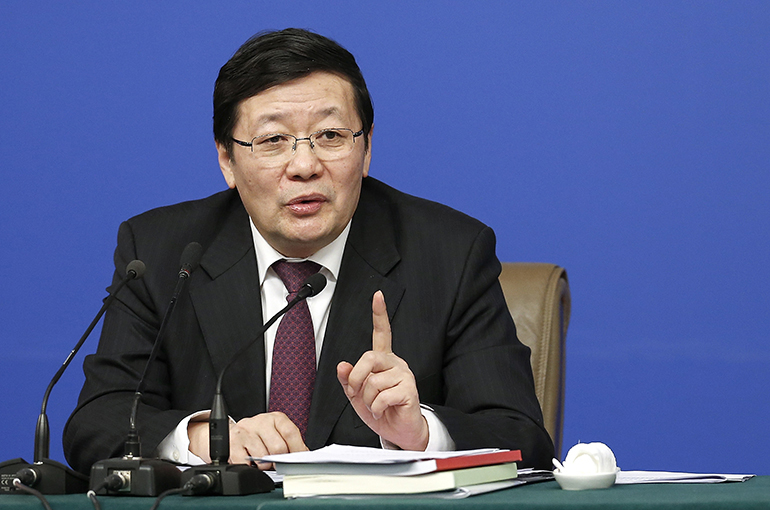 Raise China’s Fiscal Deficit to Support Jobs, Ex-Finance Minister Says
Raise China’s Fiscal Deficit to Support Jobs, Ex-Finance Minister Says(Yicai Global) July 11 -- China’s fiscal deficit should be increased to maintain moderate economic growth and boost employment, a former Chinese finance minister has advised in an article for Economic Daily.
“Barring exceptional circumstances, the country’s economic growth will surpass 5 percent this year, which will still be smaller than the potential growth rate given last year’s low base, and will not be conducive to maintaining full employment,” Lou Jiwei, who now heads the Society of Public Finance of China, wrote in the article.
Lou suggested “timely adjustment of the budget as well as an increase of the fiscal deficit, especially the central fiscal deficit, the majority of which is applied as phased subsidies for micro, small and mid-sized firms’ rents, utility fees, and payment of interest.” This would benefit the companies, as fiscal subsidies “can directly reach their accounts,” he said, adding that “arbitrary fees and fines must be resolutely punished in order to create an excellent business environment.”
At the start of this year, the Finance Ministry set a target for the 2023 fiscal deficit of CNY3.88 trillion (USD538.9 billion), slightly higher than last year’s CNY3.37 trillion. And the central fiscal deficit target was hiked to CNY3.16 trillion from CNY2.65 trillion in 2022.
Lou told China Daily recently that the deficit target for this year should be raised by CNY1.5 trillion to CNY2 trillion, with the majority of the increase coming in the central fiscal deficit. This would guarantee the normal operation of micro, small and mid-sized firms, allowing them to provide employment, he explained, adding that central fiscal funds can be used to grant consumption coupons to expand demand.
Some of China’s economic indicators have weakened since April and the downward pressure on the economy has increased. In the middle of last month, the State Council, the country’s cabinet, studied policies and measures to boost the economy, which has raised expectations of adjustments in fiscal policy.
Fiscal Policy Priority
As per an official document released earlier this month, Finance Minister Liu Kun revealed work targets for the second half of the year, and improving the effectiveness of proactive fiscal policies will be the top priority. But the document did not mention any increase in the fiscal deficit. [Link for reference: China’s Fiscal Policy: What Are the Second-Half Priorities for 2023? (yicaiglobal.com)]
Expanding the fiscal deficit could help in enhancing the proactive fiscal policies, but it also depends on the situation, Yang Zhiyong, director of the Research Center of Finance and Taxation at the Chinese Academy of Social Sciences, told Yicai Global, adding that the right conditions for raising the deficit have not yet emerged.
The current risks regarding Chinese local government debt are generally considered controllable, but some local governments have higher risks and greater repayment pressures. Since the beginning of the year, some local governments have been seeking assistance to resolve hidden county-level debts, which has raised expectations of potential debt swaps via local government bond issuance.
Debt Swaps “Cannot Be Allowed”
But resolving local government debt risks through issuing bonds would cause moral hazard and lead to continuous expansion in the size of local government debt, Lou told China Daily. The risks should be gradually resolved via debt rollover and asset sales, he said.
“We’ve done debt replacement before, and the current size of the debts is larger,” Lou noted. “Doing it again will further enlarge the debt size, so it cannot be allowed.”
From 2015 to 2019, China issued replacement bonds worth about CNY12.36 trillion. And to resolve local government debt risks, the country also issued about CNY1.1 trillion of special re-financing bonds from 2020 to June last year, to replace existing hidden debts. But China has not issued any special re-financing bonds for the same purpose since June 2022.
Lou was China’s finance minister from March 2013 to November 2016.
Editor: Tom Litting